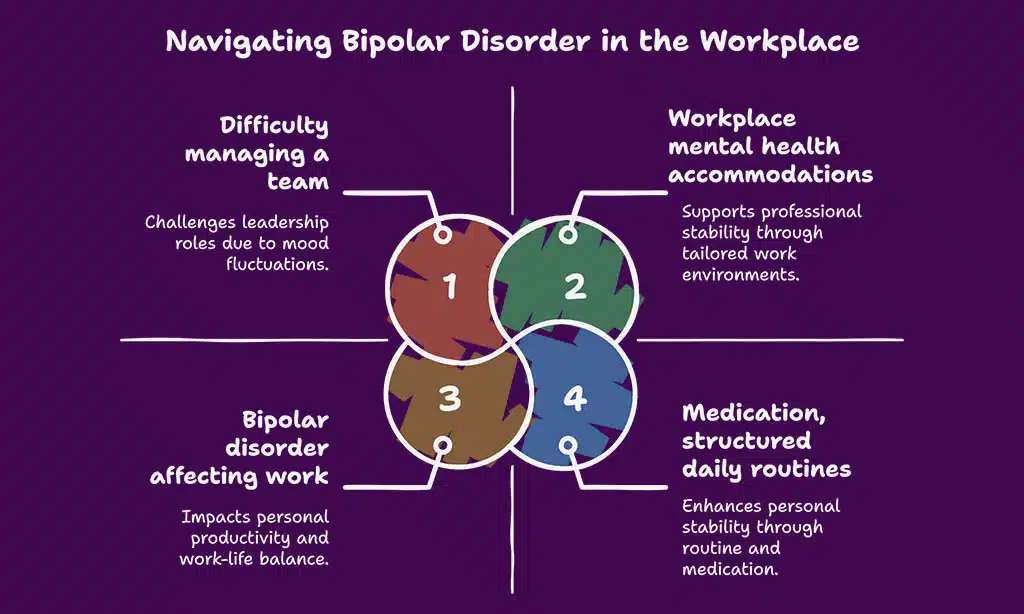Mental health is a critical yet often overlooked aspect of professional life. Many high-achieving professionals struggle with stress, anxiety, depression, burnout, and other mental health challenges.
However, their stories of resilience and perseverance serve as powerful examples for others facing similar struggles. In this article, we share 10 inspiring stories of professionals overcoming mental health challenges, illustrating how they managed to regain control of their lives and careers.
These stories not only highlight the battles faced by professionals in different industries but also offer practical takeaways, strategies, and resources to help those who may be struggling with similar issues.
This article provides an in-depth look at the impact of mental health on professional success, real-life stories of overcoming adversity, and actionable strategies that anyone can implement to maintain their well-being in high-pressure careers.
Why Mental Health Matters for Professionals
The Impact of Mental Health on Career and Productivity
Mental health issues can significantly impact an individual’s productivity, focus, and ability to perform their job effectively. Studies have shown that untreated mental health conditions can lead to increased absenteeism, reduced efficiency, and poor decision-making. According to the World Health Organization (WHO), depression and anxiety cost the global economy an estimated $1 trillion per year in lost productivity.
Key Statistics on Mental Health in the Workplace
| Statistic | Source |
| 1 in 5 adults experience mental illness each year. | National Alliance on Mental Illness (NAMI) |
| 83% of employees feel emotionally drained from work. | American Psychological Association (APA) |
| 50% of millennials and 75% of Gen-Zers have left a job for mental health reasons. | Harvard Business Review |
Common Mental Health Challenges Faced by Professionals
| Mental Health Challenge | Symptoms & Effects |
| Anxiety Disorders | Persistent worry, panic attacks, trouble concentrating, physical symptoms like sweating or rapid heartbeat. |
| Depression | Chronic sadness, loss of interest in activities, sleep disturbances, low energy levels. |
| Burnout | Emotional exhaustion, cynicism, detachment from work, decreased performance. |
| Post-Traumatic Stress Disorder (PTSD) | Flashbacks, nightmares, severe anxiety, and emotional distress triggered by past experiences. |
| Imposter Syndrome | Self-doubt, fear of being exposed as a fraud, reluctance to take on new challenges. |
How Overcoming Mental Health Challenges Leads to Growth
Professionals who address their mental health issues often experience personal and career growth. They develop resilience, improved coping mechanisms, and stronger emotional intelligence, making them better leaders and team players. Companies that foster mental health support see higher retention rates, improved morale, and increased productivity. Organizations such as Google, Microsoft, and Deloitte have implemented mental health programs, resulting in improved employee satisfaction and reduced turnover rates.
10 Inspiring Stories of Professionals Overcoming Mental Health Challenges
Each of these stories represents a unique journey of overcoming mental health struggles, demonstrating courage, perseverance, and growth. These individuals turned their challenges into strengths, ultimately leading to professional success and personal fulfillment.
1. A CEO Who Turned Anxiety into Leadership Strength
A tech industry CEO struggled with anxiety for years, which initially hindered his ability to make decisions and manage his team effectively. The constant pressure of leading a company led to panic attacks, self-doubt, and overwhelming stress.
He found himself avoiding important meetings and second-guessing critical choices. Realizing the need for change, he sought therapy and adopted mindfulness practices to regain control. Implementing structured work routines and delegation strategies helped him manage stress levels.
Over time, he turned his anxiety into a strength, using it as a tool for deeper self-awareness and better leadership. Today, he openly advocates for mental health awareness in corporate environments, encouraging leaders to prioritize their well-being.
Key Features of His Recovery Journey
| Challenge | Solution Implemented |
| Anxiety affecting leadership | Cognitive Behavioral Therapy (CBT) |
| Struggles with decision-making | Structured work routines |
| Workplace stress | Mindfulness and meditation |
2. A Lawyer’s Battle with Depression and the Path to Advocacy
A high-profile lawyer experienced severe depression due to immense work pressure, long hours, and an intense courtroom environment. The demanding nature of her job left her feeling isolated, overwhelmed, and struggling to find balance.
Her mental health deteriorated to the point where she considered leaving the profession entirely. Seeking therapy, she gained coping mechanisms to manage stress, and with the help of medication, she regained stability. Establishing firm work-life boundaries allowed her to reclaim her personal time.
Now, she runs workshops on mental health awareness in the legal field, advocates for policy changes, and helps other legal professionals navigate mental health challenges effectively.
Key Features of Her Journey
| Challenge | Recovery Strategy |
| Depression due to high-pressure work | Therapy and lifestyle changes |
| Workplace mental health stigma | Legal policy advocacy |
3. A Teacher Overcoming Burnout to Inspire Future Generations
A passionate teacher suffered burnout after years of managing large classes, grading assignments, and handling administrative duties. The constant pressure led to extreme fatigue, anxiety, and loss of motivation in her career.
She realized she needed to prioritize her mental well-being and began practicing meditation, regular exercise, and mindfulness techniques. By setting boundaries at work and seeking peer support, she gradually regained her energy and passion for teaching.
Now, she mentors other teachers on mental well-being, helping them recognize the importance of self-care and balance in their profession.
Key Features of Her Recovery
| Issue | Solution Implemented |
| Burnout and exhaustion | Regular breaks, mindfulness practices |
| Lack of mental health training | Peer support groups |
4. A Doctor’s Personal Fight Against PTSD
A frontline doctor developed PTSD after witnessing multiple traumatic cases, leading to severe emotional distress, flashbacks, and difficulty performing his duties. He struggled with sleep disturbances, heightened anxiety, and overwhelming feelings of helplessness. Recognizing the need for professional help, he sought therapy and joined support groups tailored for medical professionals.
Through cognitive behavioral therapy (CBT) and peer discussions, he gradually regained control over his emotions and professional life.
Inspired by his journey, he founded a mental health support network to help fellow doctors cope with the emotional toll of their demanding careers, promoting a culture of well-being and resilience in the medical field.
Key Features of His Recovery
| Challenge | Recovery Path |
| PTSD from medical trauma | Therapy, peer support groups |
| Emotional exhaustion | Cognitive Behavioral Therapy (CBT) |
5. From Breakdown to Breakthrough: An Engineer’s Journey with Bipolar Disorder
A software engineer diagnosed with bipolar disorder faced significant career setbacks due to unpredictable mood swings, making it difficult for him to maintain focus and team collaboration.
His condition led to periods of extreme energy followed by deep depression, impacting his ability to meet deadlines and communicate effectively with colleagues. After facing challenges in multiple job roles, he sought professional medical help, including therapy and medication, to regulate his symptoms.
He also implemented structured daily routines, exercise, and mindfulness techniques to create stability. Over time, he regained control of his career and built a strong professional network.
Now, he successfully manages a high-performing team and openly discusses mental health at tech conferences to break the stigma surrounding bipolar disorder in the workplace.
Key Features of His Journey
| Challenge | Recovery Path |
| Bipolar disorder affecting work | Medication, structured daily routines |
| Difficulty managing a team | Workplace mental health accommodations |
6. A Journalist’s Journey of Conquering Anxiety and Finding Confidence
A journalist with a successful career found herself battling severe anxiety due to the high-pressure nature of her job. The fear of making mistakes, meeting tight deadlines, and handling public scrutiny took a toll on her mental well-being.
She often struggled with self-doubt, panic attacks, and sleepless nights. After recognizing the impact on her health, she sought therapy, adopted structured breathing exercises, and began practicing mindfulness techniques.
Through time management strategies and setting realistic work expectations, she regained confidence. Today, she not only manages her career effectively but also shares her experiences to help other journalists cope with stress and anxiety.
Key Features of Her Recovery
| Challenge | Solution Implemented |
| Public scrutiny anxiety | Breathing techniques, cognitive therapy |
| Tight deadlines causing stress | Time management and work-life balance |
7. A Freelancer’s Story: Overcoming Isolation and Depression
A freelance designer faced severe depression due to the loneliness of working from home. Without daily interactions or a structured work environment, she struggled with motivation and productivity. The lack of social engagement led to feelings of detachment and emotional exhaustion. Recognizing the impact on her mental health, she took proactive steps to change her lifestyle.
By joining co-working spaces, attending networking events, and establishing a structured daily routine, she regained her confidence. Today, she is thriving in her freelance career while advocating for mental well-being among remote workers.
.Key Features of Her Recovery
| Challenge | Solution Implemented |
| Work-from-home isolation | Co-working spaces, networking events |
| Depression from lack of structure | Creating a daily routine, therapy |
8. A Finance Executive’s Struggles with Workaholism and Recovery
A high-powered finance executive found himself working 16-hour days, neglecting his health, relationships, and personal happiness. His addiction to work masked deeper struggles with anxiety and perfectionism, leading to severe burnout and physical health issues.
Over time, he recognized the impact of his workaholism and sought professional help. Through therapy, mindfulness techniques, and setting firm work-life boundaries, he regained a sense of balance.
Now, he actively promotes healthy work culture within his organization, encouraging employees to prioritize mental health over excessive work commitments.
Key Features of His Recovery
| Challenge | Solution Implemented |
| Workaholism masking deeper issues | Therapy, setting boundaries |
| Neglecting personal life | Prioritizing family and hobbies |
9. A Social Worker Who Found Strength Through Therapy
A dedicated social worker spent years helping others while neglecting her own mental health. The emotional weight of dealing with trauma victims, abuse cases, and vulnerable communities left her feeling drained, anxious, and overwhelmed.
Over time, she developed compassion fatigue and struggled with burnout, making it difficult to continue her work effectively. After a close colleague encouraged her to seek therapy, she finally took the step to prioritize her well-being.
Through counseling, she learned coping techniques, stress management skills, and the importance of setting emotional boundaries. By incorporating self-care routines and mindfulness into her daily life, she regained her passion for social work.
Now, she actively mentors other professionals in her field on maintaining mental resilience while serving others.
Key Features of Her Recovery
| Challenge | Solution Implemented |
| Emotional exhaustion | Therapy, self-care strategies |
| Compassion fatigue | Setting boundaries and mindfulness |
10. A Tech Entrepreneur Who Faced Imposter Syndrome and Won
A young tech entrepreneur struggled with imposter syndrome despite achieving significant milestones in his career. He constantly felt like a fraud, fearing that others would discover he wasn’t as competent as they believed.
The stress of these feelings began to impact his mental well-being, making him doubt his skills and hesitate when making important decisions. Through therapy, mentorship, and self-affirmation practices, he learned to reframe negative thoughts, celebrate his achievements, and develop a growth mindset.
Today, he leads a successful company and mentors young professionals facing similar challenges.
Key Features of His Recovery
| Challenge | Solution Implemented |
| Self-doubt and imposter syndrome | Positive affirmations and networking |
| Fear of failure | Growth mindset techniques |
Takeaways
Mental health challenges are prevalent in the professional world, but overcoming them is possible with the right support, resources, and self-care strategies.
The 10 inspiring stories of professionals overcoming mental health challenges featured in this article highlight the resilience and determination of individuals who turned their struggles into strengths, proving that mental health struggles do not have to define one’s career or future.
By seeking professional help, practicing mindfulness, setting healthy boundaries, and fostering workplace support, professionals can not only survive but also thrive in high-pressure environments.







































